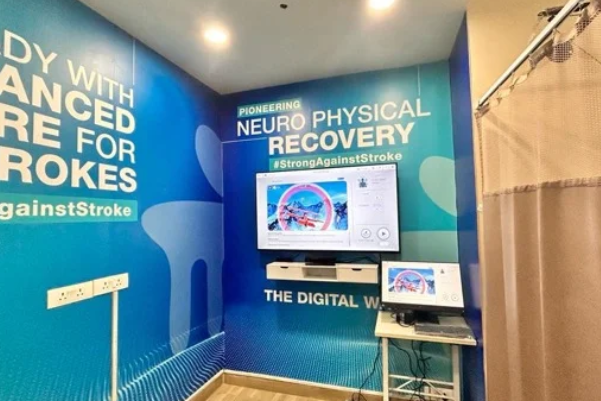TECHNOLOGY AND ADVANCE THERAPEUTICS
Virtual Reality (VR)
Virtual Reality (VR) in rehabilitation involves immersive simulations to aid physical and cognitive therapy, enhancing engagement, motivation, and outcomes for patients.

Virtual Reality (VR) in Neurorehabilitation
Virtual Reality (VR) has transcended its origins in entertainment and gaming to become a powerful tool in healthcare, particularly in the realm of rehabilitation. This comprehensive exploration delves into the essence of Virtual Reality, its myriad applications in rehabilitation, the diverse types of VR interventions available, and the numerous advantages it offers in enhancing patient outcomes and experiences.

What is Virtual Reality?
Virtual Reality (VR) is an advanced technology that creates immersive, simulated environments through computer-generated imagery and sensory feedback. Users typically wear headsets or goggles that transport them into virtual worlds where they can interact with objects, perform tasks, and experience realistic scenarios. VR technology aims to provide users with a sense of presence, allowing them to feel as though they are truly present within the virtual environment.
Uses of Virtual Reality in Neurorehabilitation
Virtual Reality (VR) has revolutionized the field of rehabilitation by offering innovative solutions to enhance patient engagement, motivation, and functional outcomes. Some of the key uses of VR in rehabilitation include:
MOTOR REHABILITATION
VR-based interventions facilitate motor learning and recovery by providing interactive exercises, task-oriented training, and real-time feedback to individuals with movement impairments due to stroke, spinal cord injury, or neurological conditions.
BALANCE AND GAIT TRAINING
VR simulations of dynamic environments and challenging terrains enable patients to practice balance exercises, gait training, and obstacle negotiation in a safe and controlled manner, promoting improved mobility and fall prevention.
COGNITIVE REHABILITATION
VR technology offers cognitive training programs designed to improve attention, memory, executive function, and problem-solving skills in individuals with cognitive impairments resulting from brain injury, dementia, or neurological disorders.
PAIN MANAGEMENT
VR-based distraction techniques provide relief from acute and chronic pain by diverting patients’ attention away from their discomfort and immersing them in relaxing, enjoyable virtual environments that promote relaxation and stress reduction.
PSYCHOLOGICAL REHABILITATION
VR exposure therapy is used to treat anxiety disorders, phobias, and post-traumatic stress disorder (PTSD) by immersing patients in virtual scenarios that evoke their fears or triggers, allowing them to confront and overcome psychological challenges in a controlled setting.
Types of Virtual Reality in Rehabilitation
Virtual Reality (VR) interventions in rehabilitation encompass various modalities and applications tailored to address specific therapeutic goals and patient needs. Some common types of VR interventions include:
IMMERSIVE VR ENVIRONMENTS
Fully immersive VR experiences transport users to realistic virtual worlds where they can interact with objects, perform tasks, and navigate through environments using head-mounted displays and motion tracking technology.
INTERACTIVE VR GAMES
Gamified VR exercises offer engaging and motivating experiences for rehabilitation, incorporating interactive elements, challenges, and rewards to promote adherence to therapy and enhance patient engagement.
SIMULATED REAL-LIFE SCENARIOS
VR simulations of real-world environments and activities allow patients to practice functional tasks, such as cooking, shopping, or driving, in a safe and controlled virtual setting, facilitating skill acquisition and transfer to real-life situations.
COGNITIVE TRAINING PROGRAMS
VR-based cognitive training programs provide interactive exercises, puzzles, and simulations to improve cognitive function and enhance brain plasticity in individuals with cognitive impairments or neurodegenerative diseases.
Advantages of Virtual Reality in Rehabilitation
Virtual Reality (VR) offers numerous advantages in the rehabilitation setting, including:
ENHANCED ENGAGEMENT
VR environments are immersive and interactive, capturing patients' attention and motivating them to actively participate in therapy sessions.
PERSONALIZED REHABILITATION
VR interventions can be customized to address individual patient needs, preferences, and therapeutic goals, allowing for tailored and adaptive treatment approaches.
SAFE AND CONTROLLED ENVIRONMENT
VR simulations provide a safe and controlled environment for patients to practice functional tasks, rehabilitation exercises, and exposure therapy without risk of injury or harm.
REAL-TIME FEEDBACK
VR systems offer real-time feedback on patient performance, allowing clinicians to monitor progress, adjust treatment parameters, and provide immediate guidance and encouragement.
INCREASED ACCESS TO THERAPY
VR technology enables remote delivery of rehabilitation services, expanding access to therapy for patients in remote or underserved areas and reducing barriers to care.
IMPROVED OUTCOMES
Studies have shown that VR-based rehabilitation interventions can lead to improvements in motor function, balance, cognition, pain management, and psychological well-being, resulting in enhanced patient outcomes and quality of life.
Virtual Reality (VR) has revolutionized the field of rehabilitation by offering innovative, immersive, and effective solutions to enhance patient care and outcomes. From motor rehabilitation to cognitive training, VR technology provides a versatile platform for delivering personalized, engaging, and evidence-based interventions across a wide range of conditions and settings. As VR continues to evolve and advance, its integration into rehabilitation practice heralds a new era of innovation, empowerment, and transformative care for individuals seeking to regain function, independence, and quality of life.
Best Physiotherapy Center in Delhi
where technology meets with holistic hands-on-therapy.
At our facility is has Best Physiotherapist in Delhi we believe in a holistic approach to rehabilitation and wellness. We offer a range of services, including sports injury rehabilitation, chronic pain management, post-operative rehabilitation, and more.
Our team also provides education and guidance to help patients manage their conditions and prevent future injuries.
Call Today
+91-9818911195 +91-9818910029


